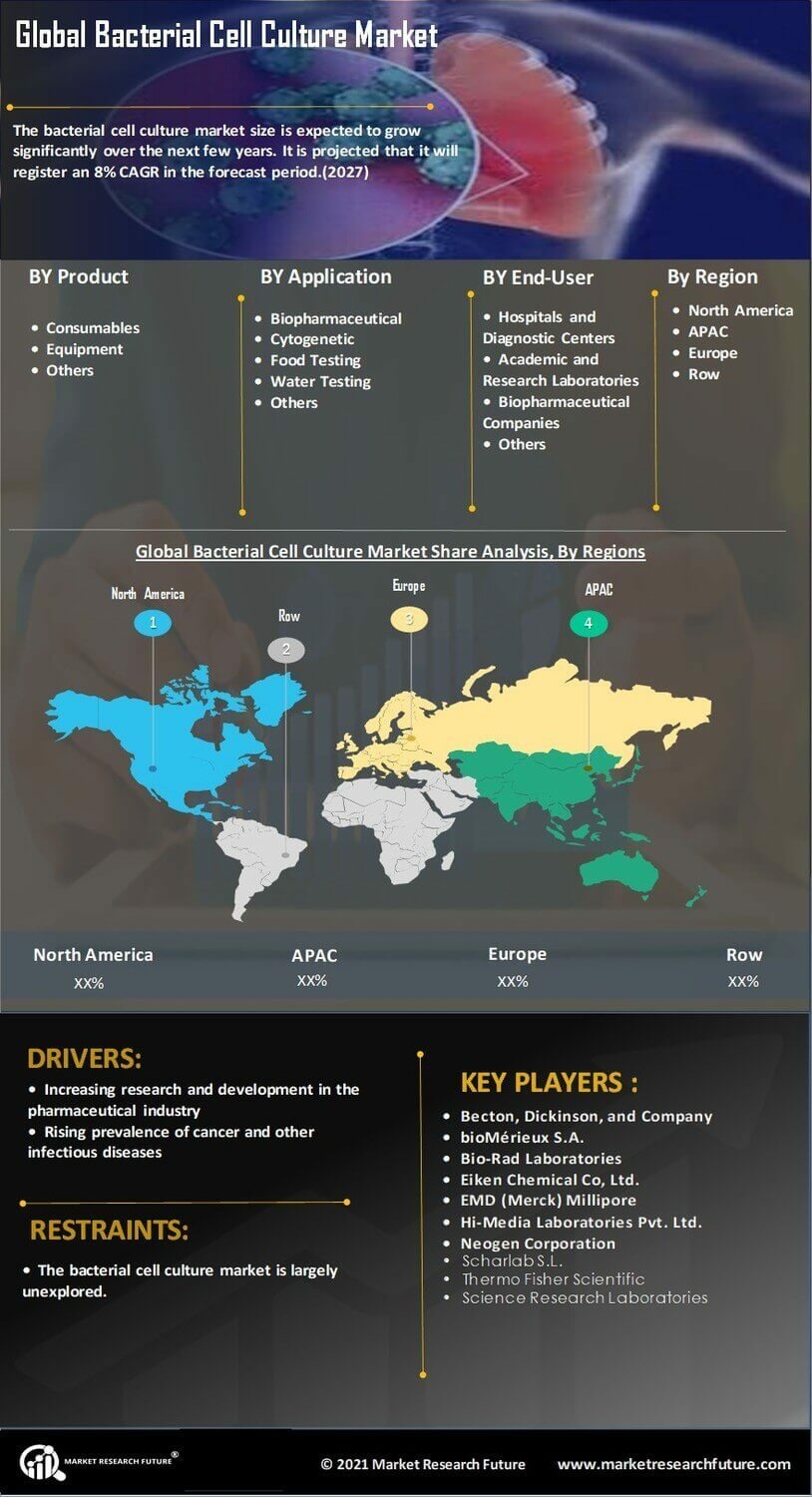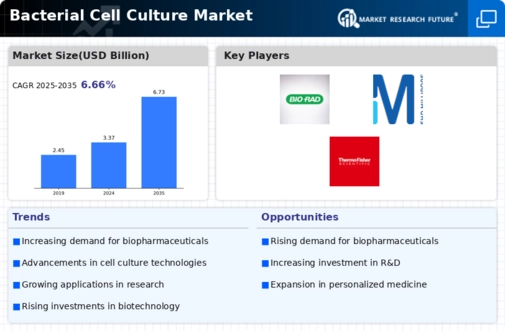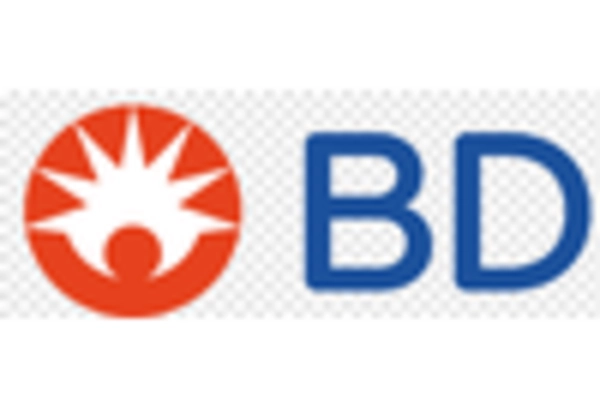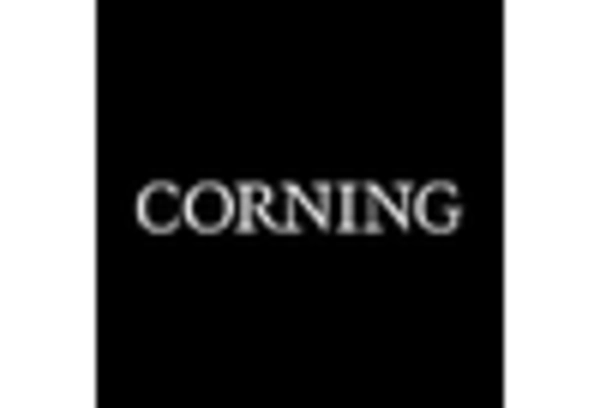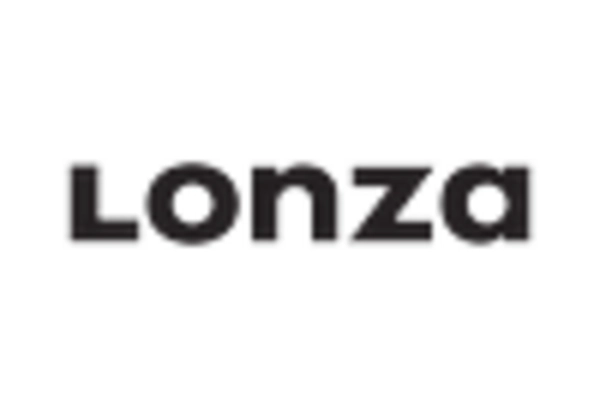Increasing Focus on Synthetic Biology
The Bacterial Cell Culture Market is significantly influenced by the increasing focus on synthetic biology. This emerging field aims to redesign organisms for useful purposes, which often involves the manipulation of bacterial cell cultures. As researchers explore the potential of synthetic biology to address global challenges, such as food security and environmental sustainability, the demand for bacterial cell culture products is likely to rise. Recent reports suggest that the synthetic biology market is expected to reach several billion dollars in the next few years, indicating a robust growth trajectory. This trend may lead to the development of novel bacterial strains and culture techniques, further enhancing the capabilities of the Bacterial Cell Culture Market. The intersection of synthetic biology and bacterial cell culture could result in groundbreaking innovations, thereby expanding the market's scope and applications.
Growing Demand for Diagnostic Applications
The Bacterial Cell Culture Market is witnessing a growing demand for diagnostic applications, particularly in clinical microbiology. The need for accurate and rapid diagnostic tools is becoming increasingly critical in healthcare settings, as timely identification of bacterial pathogens can significantly impact patient outcomes. Recent data indicates that the global market for microbiological diagnostics is on an upward trajectory, with bacterial culture techniques playing a pivotal role in this growth. The increasing prevalence of infectious diseases and the rising awareness of antibiotic resistance are further driving the demand for bacterial cell cultures in diagnostic laboratories. As healthcare providers seek reliable methods for pathogen detection, the Bacterial Cell Culture Market is likely to benefit from this trend, leading to enhanced product offerings and technological advancements.
Rising Research and Development Activities
The Bacterial Cell Culture Market is experiencing a surge in research and development activities, driven by the increasing need for innovative therapeutic solutions. Pharmaceutical and biotechnology companies are investing heavily in R&D to develop new antibiotics and vaccines, which necessitates the use of bacterial cell cultures. According to recent data, the R&D expenditure in the pharmaceutical sector has reached unprecedented levels, with a significant portion allocated to microbiological research. This trend is likely to bolster the demand for bacterial cell culture products and services, as researchers require reliable and efficient culture systems to support their experiments. Furthermore, the growing emphasis on personalized medicine is expected to further fuel the need for advanced bacterial cell culture techniques, thereby enhancing the overall market landscape.
Expansion of Biopharmaceutical Manufacturing
The Bacterial Cell Culture Market is poised for growth due to the expansion of biopharmaceutical manufacturing. As the biopharmaceutical sector continues to evolve, there is an increasing reliance on bacterial cell cultures for the production of therapeutic proteins and monoclonal antibodies. Recent statistics indicate that the biopharmaceutical market is projected to grow at a compound annual growth rate of over 8% in the coming years. This growth is likely to drive demand for bacterial cell culture systems, as manufacturers seek efficient and scalable production methods. Additionally, the shift towards more complex biologics necessitates the use of sophisticated bacterial cell culture techniques, further propelling the market forward. The integration of advanced technologies in manufacturing processes is expected to enhance productivity and reduce costs, making bacterial cell culture an essential component of biopharmaceutical production.
Technological Advancements in Cell Culture Techniques
The Bacterial Cell Culture Market is being propelled by technological advancements in cell culture techniques. Innovations such as automated culture systems, high-throughput screening, and improved media formulations are enhancing the efficiency and reliability of bacterial cell cultures. These advancements are particularly relevant in research and industrial applications, where precision and reproducibility are paramount. Recent trends indicate that the adoption of automation in laboratory processes is increasing, which may streamline workflows and reduce human error. Furthermore, the development of novel culture media tailored for specific bacterial strains is likely to improve growth rates and yield. As these technologies continue to evolve, they are expected to create new opportunities within the Bacterial Cell Culture Market, fostering a more dynamic and competitive environment.
